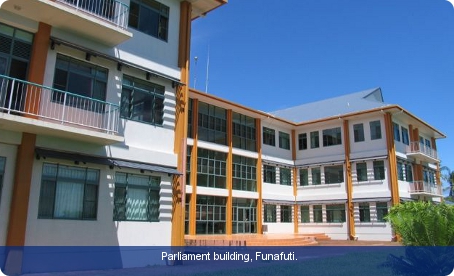Government
- Overview
- History

Tuvalu is a constitutional monarchy with a parliamentary democracy. Queen Elizabeth II of Great Britain is head of state and is represented by a governor-general. The role of the governor-general, who must be a citizen of Tuvalu, is largely ceremonial. The appointee for this position is chosen on the advice of the prime minister and parliament.
Effective executive power resides in the cabinet. The cabinet consists of the prime minister, who is elected by parliament, and up to four members of parliament, selected by the prime minister. The cabinet is responsible to parliament.
The unicameral parliament has 15 elected members. Seven islands send two members, and one, Nukulaelae, sends one. Elections are by universal suffrage (over 18). The speaker is elected by the parliament, which has the power to remove the prime minister by a vote of no confidence. Elections are held at least every four years.
Local government consists of a Town Council on the main island of Funafuti, and Island Councils on seven other islands.
The constitution provides for a judiciary and independent public service. It guarantees protection of all fundamental rights and freedoms, and determination of citizenship. The High Court is presided over by the chief justice. It hears appeals from the magistrates’ courts and the island courts, which have limited jurisdiction in civil and criminal matters. Appeals from the High Court are heard by the Court of Appeal in Fiji and the final court of appeal is the UK’s Privy Council.

Tuvalu was formerly known as the Ellice or Lagoon islands. The Gilbert and Ellice Islands Protectorate was established by Britain in 1892 (the Gilbert Islands are now called Kiribati) and the protectorate became a colony in 1916. The Ellice Islands became a separate British dependency in 1975 and gained independence as T’uvalu in 1978. Tuvalu is an old name which means ‘eight standing together’ (Tuvalu has nine islands or island groups, but one has very little land about sea level). Toaripi Lauti was independent Tuvalu’s first prime minister.
There are no political parties in Tuvalu.
In the September 2010 general election, ten of the 15 members from the previous parliament were re-elected. Parliament then elected Maatia Toafa prime minister; he defeated Kausea Natano by eight votes to seven. On 21 December 2010, however, the new head of government was defeated in a no-confidence vote and on 24 December Willy Telavi was chosen by parliament to succeed him, defeating Enele Sopoaga by eight votes to seven.



